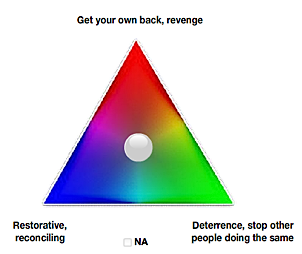Menu
 I’m looking for help with a very interesting project we are about to start. It will look to measure the impact of Government on issues relating to equality before the law. You know the sort of thing, access to the courts regardless of status, class or money in both civil and criminal cases. As a part of that programme we want to present a series of artefacts to broad populations of people to see what stories they inspire in people. Both how they believe the world should be, and how those artefacts relate to their day to day lives, those of their friends, relatives and other members of the communities in which they live . By artefact I mean a picture, short video clip, written or spoken story, cartoon, painting; basically anything which can be digitally represented.
I’m looking for help with a very interesting project we are about to start. It will look to measure the impact of Government on issues relating to equality before the law. You know the sort of thing, access to the courts regardless of status, class or money in both civil and criminal cases. As a part of that programme we want to present a series of artefacts to broad populations of people to see what stories they inspire in people. Both how they believe the world should be, and how those artefacts relate to their day to day lives, those of their friends, relatives and other members of the communities in which they live . By artefact I mean a picture, short video clip, written or spoken story, cartoon, painting; basically anything which can be digitally represented.

To give you an example, imagine a cartoon of a rich man and a poor man in front of the scales of justice or the Statue of Liberty. There is a clear context but an ambiguous message. The first screen of the capture (this is the SenseMaker™ Auditor module) presents a series of these images and each respondent chooses the image which has the most impact and then speaks or writes their story (linking to pictures or other material if they want) in response to the artefact. They then signify what it means, for example by positioning their story on a series of triads (patent pending by the way). I illustrate one of these related to three types of justice t and in the live system there will have six triads as well as other questions. All contributions will be anonymous, although basic demographic data will be captured.
The way people signify what their story means will give us quantitative data, as will which images were chose by which age groups or other demographic criteria. Once normed we will be able to measure ways in which government has engaged with its citizens in what for everyone is a key aspect of good government namely the provision of justice. I naturally exclude from that statement the deuded supporters of the evil Ayn Rand (or maybe its the evil supporters of the deluded Ayn Rand).
We will also be able to provide an anecdotal evidence base to support objective quantitative data. Its all part of what I have previously referenced as impact measurement which to my mind is a necessary replacement for many an outcome based target. In addition we have valuable research data which relies on distributed cognition to allow mass, low cost participation which is dynamic and continuous in nature. Too many surveys and focus groups are one off sessions or staccato events with significant gaps between data capture points.
We will capture via kiosks placed in specific locations, a web site or two which can be accessed anywhere, Facebook, interviews and field capture using the software downloaded to an iTouch.
― ― ― ― ― ― ― ― ― ― ― ― ― ―
So what are we looking for?
Well, we’d like ideas in several areas:
Aside from my gratitude (of questionable value), anyone who gives us a good idea will get access to public aspects of the report we will produce. Cognitive Edge network members might also like to think of this as a good way to get experience on a real project. There is a good chance that there will be opportunities for voluntary engagement.
If there are any school or college teachers who see this as an interesting student project on jurisprudence, ethics or similar subjects et us know, we will be able to involve you with the research and allow use on school/college projects etc.
Feel free to leave ideas here as comments or email me direct. Happy to take any general enquiries via the same routes.
Cognitive Edge Ltd. & Cognitive Edge Pte. trading as The Cynefin Company and The Cynefin Centre.
© COPYRIGHT 2024

BBC2 has a very interesting programme on snow this evening, some fascinating stuff on ...